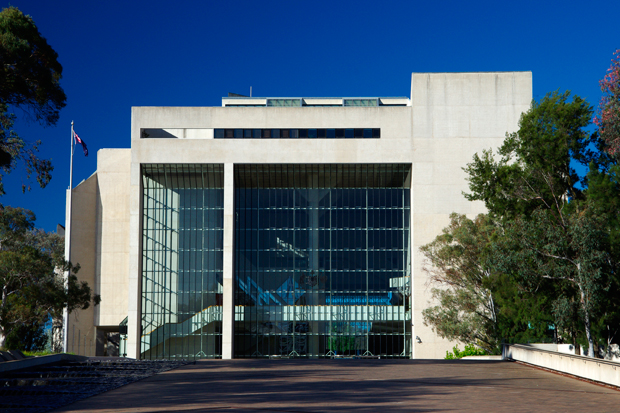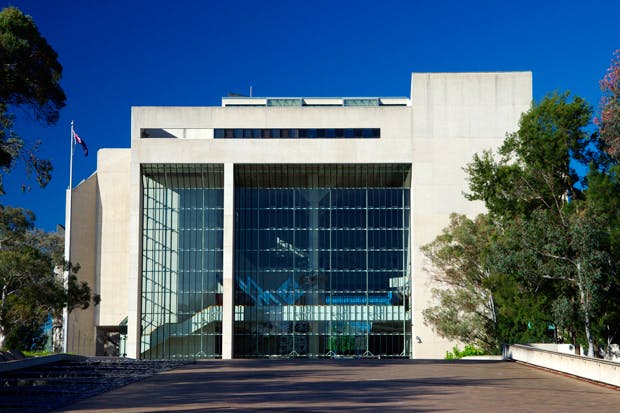On 2 July this year, a handful of Australians from the West, numbering in the tens of thousands, dispatched a man named Rodney Norman Culleton to the federal Parliament. Culleton is a member of Pauline Hanson’s One Nation Party. In David Cameron’s coinage he is, then, a swivel-eyed loon.
Sometime in September, the loon from the West was served with a High Court writ. A fellow Western Australian, himself also part of a top paddock marsupial outbreak, was challenging Culleton’s eligibility for office. It seems Mr Culleton had been convicted of an offence, meaning the Constitution barred him from the Parliament.
Culleton has a Certificate in Sheep and Wool from Fremantle TAFE. And a Certificate in Animal Psychology. He has spent much of his life as a wool classer and buyer. He does not have a law degree.
But he noticed something about that writ.
And so, on 12 September, Culleton rose for the first time in the Senate to ask the Attorney-General (I paraphrase): ‘Section 33 of the High Court of Australia Act requires that High Court writs be issued in the name of the Queen. But High Court writs in fact make no mention of the Queen. Why has the High Court defied the Parliament?’
Under the High Court of Australia Act, the Justices of the High Court make the Court’s Rules, which contain the nitty-gritty of court procedure, including the forms of writs issued to defendants like Culleton. So, when Culleton was handed the writ challenging his election, he was looking at a document in a form approved by the High Court Justices back in 2004.
It would be easy to dismiss Culleton as peddling the usual sort of legal amateur’s pet theory. You know the type: the US Constitution says the Congress can ‘coin’ money, so it can issue coins but not paper notes, so all American paper money is invalid, so when I took out that loan it was actually worthless, so I didn’t actually take out that loan, so I don’t actually owe you any money at all, and so on.
For all that, it is of more than passing interest whether the High Court — guardian of the Constitution, keeper of the legal flame — obeys laws made by our elected representatives. Some Australians — a considerable number if the polls are to be believed, though probably not many in the rarefied climes of the nation’s capital — quite like our constitutional arrangements, including the Crown. And those Australians might expect that the High Court follow law and tradition, and issue writs in Her Majesty’s name.
So, has the High Court been defying the Parliament all these years?
The Attorney-General takes Culleton’s question on notice. Inquiries are made of the High Court — guardian of the Constitution, keeper of the legal flame. Delay. Finally, the Court deigns to send the people’s representatives a missive: the High Court’s Rules Committee will consider the matter.
The ‘Rules Committee’ is really just the Court’s Justices in civvies. The question they will consider: the law commands the High Court to do something, but the High Court does not do it — why?
More delay.
And finally this: ‘The Rules Committee of the High Court considered the issue on 12 October 2016. The Committee proposes a number of amendments to the Rules to address the issue.’
Translation: ‘Contrary to what the law requires, the Court’s writs make no mention of that biddy on the throne. Oh well. Back to the drawing board.’
Alternative translation: ‘The seven Justices of the High Court who drafted the Rules defied the Parliament. So have all the Justices of the High Court since the Rules were introduced. The slack-jawed yokel with the Animal Psychology Cert. is dead right.’
But that was not all. Our judicial oracles did what lawyers do best. They obfuscated. They shifted blame. They protested that before the making of the Rules there had been consultation. Extensive consultation. An exposure draft had been ‘the subject of detailed comments by the Law Council of Australia’.
And by the Australian Bar Association. And by ‘the Special Committee of Solicitors-General’. Detailed comments! By the Special Committee of Solicitors-General, no less!
And in their ‘detailed comments’, did any of these lawyers point out, as did Senator Culleton, that the Rules were, um, against the law? ‘No issue was raised in the process of drafting or consultation concerning the consistency of the Rules with section 33 of the High Court of Australia Act 1979 (Cth).’
Translation: ‘Who cares about the Queen, anyway?’
Alternative translation: ‘The seven Justices of the High Court, the Law Council of Australia, the Australian Bar Association and the Special Committee of Solicitors-General don’t care what the law actually says. Either that or they are not as observant as the swivel-eyed wool classer from Western Australia.’
Ponder that. Most of the time, ordinary folk don’t understand the gobbledygook spouted by the judiciary, so its work can be scrutinised only by the legal profession itself. Only, that is, by the members of the Law Council of Australia, the Australian Bar Association and the Special Committee of Solicitors-General. Only, in other words, by the very people who in 2004 either didn’t care or didn’t notice that the high priests of Australian law were proposing to ignore the law.
But on this occasion, an upstart crackpot took the time to look into what was going on. And he called bullshit. And he was right. He was right on an issue as fundamental as this: the Parliament — the people’s elected representatives — commanded the High Court to do something, and for over a decade the Court has disobeyed.
How much more might this happen if more people, more often, could hack away the thickets of lawyers’ verbiage and see what our legal elites were actually up to?
So, raise a glass to Senator Culleton. Raise a glass to the handful of loons who sent him to the Parliament. And raise a glass to loons across the western world — all those loons who take a closer look at what their highly-educated, highly-intelligent elites are doing, and then call it for what it is: bullshit.
The post High Court lawbreakers appeared first on The Spectator.
Got something to add? Join the discussion and comment below.
Get 10 issues for just $10
Subscribe to The Spectator Australia today for the next 10 magazine issues, plus full online access, for just $10.
You might disagree with half of it, but you’ll enjoy reading all of it. Try your first month for free, then just $2 a week for the remainder of your first year.














Comments
Don't miss out
Join the conversation with other Spectator Australia readers. Subscribe to leave a comment.
SUBSCRIBEAlready a subscriber? Log in